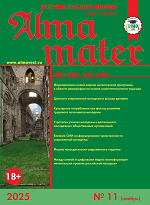Filipp Yu. Kushnarev, Cand. Sc. (Politics), Assistant Professor, Department of Social Policy Yaroslavl State University, e-mail: kushnarevcustoms@mail.ru
Sergei A. Baburkin, Dr. Sc. (Politics), Head of the Department of Social and Political studies, Yaroslavl State Pedagogical University named after K.D. Ushinsky, e-mail: baburkin@mail.ru
Vladislav V. Aleshin, Post-graduate student, Yaroslavl State Pedagogical University named after K.D. Ushinsky, e-mail: aleshin_vladislav@lenta.ru
Vladimir N. Kudashov, External postgraduate of the Department of Social and Political Studies, Yaroslavl State Pedagogical University named after K.D. Ushinky, e-mail: marab20029@rambler.ru
Marina A. Zaitseva, Cand. Sc. (Pedagogy), Associate Professor of the Department of Social Pedagogy and Organization of work with Youth; Advisor to the Rector on Information Policy Yaroslavl State Pedagogical University named after K.D. Ushinsky, e-mail: m.zayceva@yspu.org
The article analyzes the role of parents in children’s professional self-determination. The authors conducted a sociological survey among graduates of pedagogical, medical, and technical universities in Yaroslavl. The results showed that key factors in professional self-identification are family values and a reference person, rather than the opinions of friends or advertising in the media. Children from families with a service-oriented mission (e.g., teachers, military personnel, firefighters, police officers, healthcare workers) typically follow their parents’ life path. The majority of students surveyed acknowledged that their parents’ opinion plays an important role in their choice of future education and profession. However, only a small number of parents preferred to stay out of the way when it comes to choosing their children's educational and professional path. The study revealed that the professional goals of most children from doctor’s families coincided with those of their parents. On the other hand, students who entered university under parental coercion were found to have lower academic performance. These students are more likely to suffer from stress, apathy and alcohol dependence compared to those who independently and consciously chose their place of study. Students who, thanks to their parents’ support, actively developed through after-school activities (for example, dance or sports), quickly identified their strengths and weaknesses, and consciously chose their university and future profession. The author notes that medical education is an elite and inherited profession, as many students in medical universities have family members related to medicine. Obviously, in the context of social change, it's difficult to find a stable, well-respected, well-paying job that allows for social connections.
Keywords and phrases: professional self-determination, life scenario, reference personality, values, attitudes, family resources
References
1. Kushnarev, F.Yu. Attitude of students of pedagogical universities to the future profession of teacher. Alma Mater (Vestnik vysshey shkoly). 2024. No. 4. P. 39-45. DOI: 10.20339/AM.04-24.39
2. Achmizova, S.Ya. Specificity of professional self-determination of high school students in the conditions of a holistic educational space. World of Science, Culture, Education. 2024. No. 1 (104). P. 386–387.
3. Kocheshkov, G.N. Pedagogical ideas of N.A. Rozhkov. Yaroslavl Pedagogical Vestnik. 2012. Vol. 1. No. 4. P. 44–48.
4. Talanov, S.L. The influence of reference personality, social capital of the family group on the formation of educational and professional strategy of children. Alma Mater (Vestnik vysshey shkoly). 2020. No. 4. P. 28–37. DOI: 10.20339/AM.04-20.28
5. Artino, A.R., Stephens, J.M. (2009) Academic Motivation and Self-Regulation: A Comparative Analysis of Undergraduate and Graduate Students Learning Online. The Internet and Higher Education. 2009. Vol. 12. No. 3. P. 146–151.
6. Birgenau, Robert J., Yudof, Mark G., Edley, Christopher F.Jr. Challenges to public universities. In: Bulletin of the American Academy of Arts and Sciences. Winter. 2009.
7. Eckstein, Megan. Community colleges see stimulus bill as bonanza for their students. The Chronicle of Higher Education. February 17, 2009.
8. Aucejo, E.M., French, J.F., Ugalde, Araya M.P., Zafar, B. (2020) The Impact of COVID‑19 on Student Experiences and Expectations: Evidence from a Survey. NBER Working Paper no. 27392. Cambridge, MA: National Bureau of Economic Research.
9. Berezin, D.T., Rumyantseva, E.S. Impact of COVID-19 on the system of higher education. Alma Mater (Vestnik vysshey shkoly). 2020. No. 10. P. 12–22. DOI: 10.20339/AM.10-20.12
10. Mikhaleva, M.V. Small city environment in the organization of professional self-determination of high school students. Otechestvennaia i zarubezhnaia pedagogika. 2024. Vol. 1. No. 1 (97). P. 108–116.











.png)






